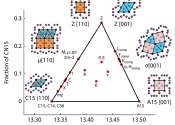The word paradigm ( /ˈpærədaɪm/) has been used in science to describe distinct concepts. It comes from Greek "παράδειγμα" (paradeigma), "pattern, example, sample" from the verb "παραδείκνυμι" (paradeiknumi), "exhibit, represent, expose" and that from "παρά" (para), "beside, beyond" + "δείκνυμι" (deiknumi), "to show, to point out".
The original Greek term παράδειγμα (paradeigma) was used in Greek texts such as Plato's Timaeus (28A) as the model or the pattern that the Demiurge (god) used to create the cosmos. The term had a technical meaning in the field of grammar: the 1900 Merriam-Webster dictionary defines its technical use only in the context of grammar or, in rhetoric, as a term for an illustrative parable or fable. In linguistics, Ferdinand de Saussure used paradigm to refer to a class of elements with similarities.
The word has come to refer very often now to a thought pattern in any scientific discipline or other epistemological context. The Merriam-Webster Online dictionary defines this usage as "a philosophical and theoretical framework of a scientific school or discipline within which theories, laws, and generalizations and the experiments performed in support of them are formulated; broadly: a philosophical or theoretical framework of any kind."









